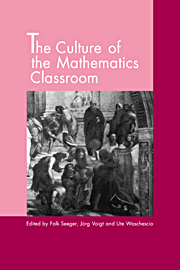Book contents
- Frontmatter
- Contents
- List of contributors
- Acknowledgments
- Introduction
- Part I Changing classroom culture
- Part II Classroom processes
- Part III Epistemology and classroom culture
- 9 The culture of the mathematics classroom and the relations between personal and public knowledge: An epistemological perspective
- 10 Problems of transfer of classroom mathematical knowledge to practical situations
- 11 Cultural perspectives on mathematics and mathematics teaching and learning
- 12 Representations in the mathematics classroom: Reflections and constructions
- 13 Mathematical understanding in classroom interaction: The interrelation of social and epistemological constraints
- Part IV Outlook
- Author index
- Subject index
9 - The culture of the mathematics classroom and the relations between personal and public knowledge: An epistemological perspective
Published online by Cambridge University Press: 03 May 2010
- Frontmatter
- Contents
- List of contributors
- Acknowledgments
- Introduction
- Part I Changing classroom culture
- Part II Classroom processes
- Part III Epistemology and classroom culture
- 9 The culture of the mathematics classroom and the relations between personal and public knowledge: An epistemological perspective
- 10 Problems of transfer of classroom mathematical knowledge to practical situations
- 11 Cultural perspectives on mathematics and mathematics teaching and learning
- 12 Representations in the mathematics classroom: Reflections and constructions
- 13 Mathematical understanding in classroom interaction: The interrelation of social and epistemological constraints
- Part IV Outlook
- Author index
- Subject index
Summary
This chapter is a contribution to an exploration of the culture of the mathematics classroom. It adopts an epistemological perspective, which immediately raises a number of questions.
What can be learned from an epistemological perspective on the culture of the mathematics classroom?
Given that the central concern of epistemology is knowledge, what role does mathematical knowledge in its various manifestations play in the culture of the classroom?
How can the specific character of mathematical knowledge be described?
Does it change during the transition from the discipline into the classroom?
What is the relationship between personal and public knowledge of mathematics?
What is the relationship between the cultures of school mathematics and research mathematics?
How does mathematical knowledge give rise to epistemological obstacles?
Which specific epistemological structures of, and processes related to, school-mathematical knowledge are generated by the everyday culture of the mathematics classroom?
What is the relationship between “structural necessities” and “social conventions” of mathematical knowledge in the educational interaction?
These are some of the deep questions raised by an epistemological perspective on the culture of the mathematics classroom. Clearly in this chapter it is not possible to do more than clarify some of the questions, raise some of the issues, and sketch some of the directions from which answers might come. However I do offer the sketch of a theoretical model of mathematical knowledge genesis and warranting that provides a unified position from which such questions can be addressed.
- Type
- Chapter
- Information
- The Culture of the Mathematics Classroom , pp. 245 - 268Publisher: Cambridge University PressPrint publication year: 1998
- 9
- Cited by



